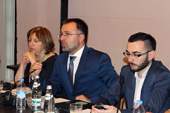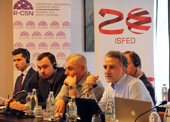
CSOs hold report presentation on self- government bodies’ activities
By Etuna Tsotniashvili
Monday, June 20
Representatives of Civil Society organisatio ns (CSOs) held a report presentation which concerned the activities of self-government bodies in Georgia and the ongoing process of decentralization.
The report presentation was held in the framework of a conference entitled 'Self-Government Bodies and the Decentralization Process - Evaluation by the Civil Society Organisations', which was organized by the Civil Development Agency (CiDA) and the International Society for Fair Elections and Democracy (ISFED) on June 16. The report covered both the flaws and progress which have been identified by CSOs. In addition, the CSOs gave concrete recommendations to the government of Georgia to be taken into account during the reform process.
During the presentations, representatives of the Institute for Development of Freedom of Information (IDFI) talked about the transparency and openness of the self-governing bodies; Transparency International Georgia (TIG) focused on finances, budgetary processes and procurement; the Georgian Young Lawyers Association (GYLA) assessed the competences and powers of the self-government bodies; an ISFED representative discussed policies on human resources and holding competitions unfairly in self-government bodies; lastly, CiDA made a presentation on society’s involvement and control, nihilism and the lack of interest amongst the population to take part in public sessions.
While commenting on the presented report, the Executive Director of CiDA, Zviad Devdariani, stated that with this report, interested people will have a general overview of the decentralization process and the activities of self-government bodies in Georgia. Devdariani highlighted that the goal of the report was not to show only negative aspects and assessments, which was why the CSOs assessed the entirety of the process and presented both the negative and positive effects of it.
“In the process of evaluation, a number of pending issues have been identified, including the financial independence of municipalities, the low level of engagement of citizens in decision-making processes, as well as nepotism and other challenges. However, positive achievements should also be noted, such as such as the direct elections of various mayors and gamgebelis, and the increasing level of transparency which is very important for carrying out successful reforms.”
The head of the Department of Self-government Development and Regional Policy of the Ministry of Regional Development and Infrastructure of Georgia, Mamuka Abuladze, welcomed the CSOs' recommendations, and said that when there is one goal to achieve, it is important that government and civic organisations cooperate with each other and consider their recommendations and opinions. However, he also said that significant steps in terms of decentralization have been put forward, and nowadays central government’s involvement in self-government bodies activities is minimal, which has been caused by the fact that mayors and gamgebelis are directly elected. Abuladze claimed that the situation is different from previous years, as now there is no 'façade' self-governance in the country. He also forecast that more positive results of the reform procress are still to come.
The report was prepared by the Civil Development Agency (CiDA) and the International Society for Fair Elections and Democracy, in cooperation with the Regional Civil Society Network (R-CSN) and national civil organizations.
The report was compiled with the support of the Open Society – Georgia Foundation, the East-West Management Institute's ACCESS programme, funded by USAID, and the National Endowment for Democracy (NED).


